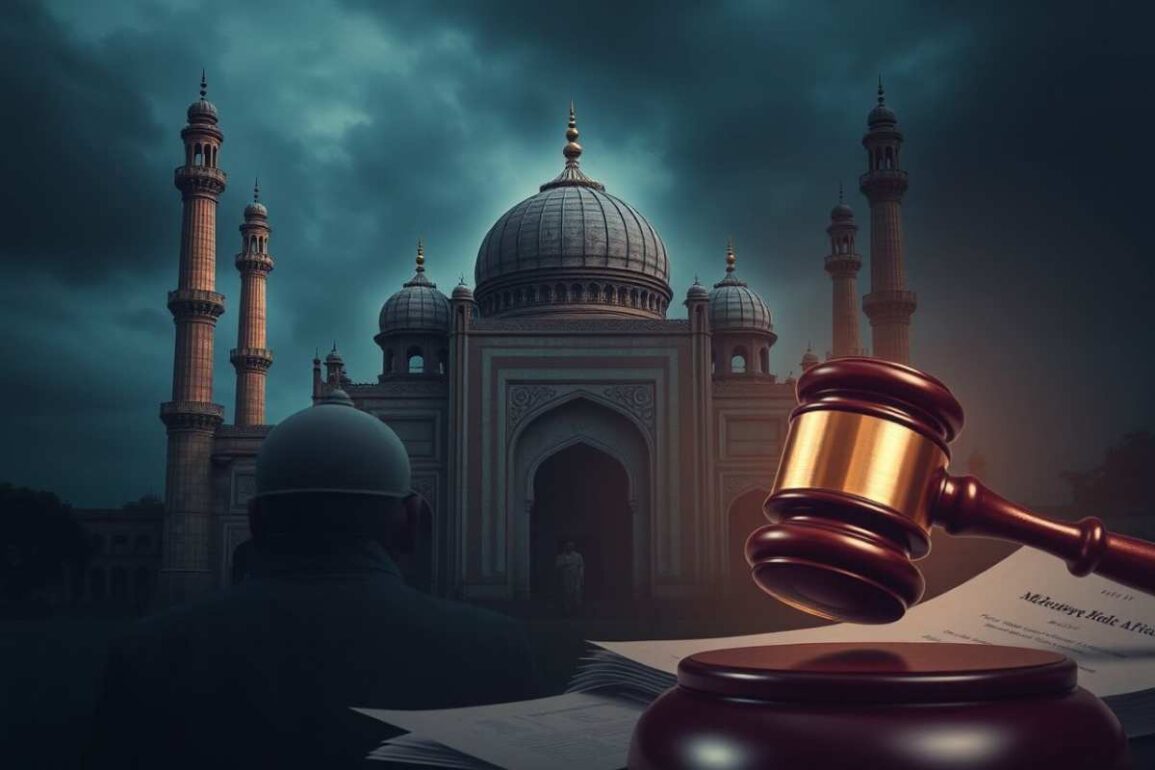In recent days there have been a series of violent events and many people wondered what is happening. In Murshidabad district, protests against the Waqf (Amendment) Act escalated into violence, resulting in the deaths of three individuals, including a father-son duo.
Demonstrators blocked National Highway 12, set police vehicles ablaze, vandalized property, and disrupted train services by pelting stones at a stationary train at Nimtita railway station.
Over 150 people have been arrested, and the Border Security Force (BSF) was deployed following a Calcutta High Court directive to restore order.
In Assam, protests against the Waqf (Amendment) Act turned violent in Silchar, where demonstrators clashed with police, vandalized public property, and pelted stones at law enforcement personnel. The situation was brought under control by the authorities.
Additionally, the All Assam Minorities Students’ Union (AAMSU) staged a protest in Guwahati, with over 75 protesters detained and later released. AAMSU has announced plans to challenge the legislation in the Supreme Court.
Why is this happening, what is this Waqf (Amendment) Act, that has triggered dissent in some states of India?
Recently, India’s Parliament has passed a controversial amendment to the Waqf Act, bringing sweeping changes to how Muslim religious endowments are governed. The bill seeks to bring changes to the powers of state waqf boards, a survey of waqf properties, and removal of encroachments by amending the Waqf Act, 1995, among other changes.
The government, led by Prime Minister Narendra Modi’s Bharatiya Janata Party (BJP), claims the reforms will increase transparency and curb corruption in the management of waqf properties—Islamic charitable trusts that include mosques, graveyards, schools, and hospitals.
But Muslim organizations, opposition parties, and legal experts warn that the Waqf (Amendment) Bill, 2025, could erode the community’s autonomy over its religious institutions while giving the state unprecedented control over the religious affairs of only one particular community.
The move has reignited debates about religious freedom and secularism in India, where Hindu nationalist policies have increasingly come under scrutiny.
What Does the Waqf Amendment Bill Change?
1. Non-Muslim Members in Waqf Boards
One of the most contentious provisions mandates that two non-Muslim members must be included in state and central Waqf boards. The government argues this will bring “diversity and accountability,” but critics see it as an infringement on religious rights.
“Why are non-Muslims being imposed on Muslim institutions when Hindu temple boards don’t have similar requirements?” asked Asaduddin Owaisi, leader of the All India Majlis-e-Ittehadul Muslimeen (AIMIM).
2. Digital Registration & Government Audits
All waqf properties must now be registered on a national digital portal within six months. The Comptroller and Auditor General (CAG) will audit Waqf boards—a move the government says will prevent financial mismanagement.
However, skeptics fear this could lead to state interference in religious affairs, especially since Hindu religious trusts are not subjected to the same level of scrutiny.
3. Abolishing “Waqf by User”
Many historic Islamic sites—such as mosques and graveyards—lack formal documentation but have been treated as waqf properties due to long-standing community use. The new bill removes this recognition, meaning only properties with legal deeds will be protected.
“This will leave thousands of Muslim sites vulnerable to government takeover or land disputes,” warned Zafarul Islam Khan, former chairman of the Delhi Minorities Commission.
4. District Collectors to Decide Waqf Disputes
Previously, Waqf tribunals handled disputes over waqf properties. Now, district collectors (government-appointed officers) will investigate claims, including cases where the government asserts ownership over waqf land.
Critics say this gives excessive power to bureaucrats, who may favor state or private interests over Muslim endowments.
5. Women’s Representation & Inheritance Rights
A positive aspect of the bill is the mandatory inclusion of at least two women on Waqf boards. It also ensures that female heirs cannot be denied inheritance in family waqfs—a progressive step in line with gender justice reforms.
Why Is the Bill So Controversial?
1. Fear of State Takeover of Waqf Land
India’s waqf system is one of the largest in the world, with 8.7 lakh properties estimated to be worth ₹1.2 lakh crore ($15 billion). The BJP has long accused Waqf boards of corruption and illegal land grabs, but Muslim leaders see the new rules as a backdoor attempt to seize control.
“This is not about reform—it’s about taking over Muslim properties under the guise of transparency,” said Maulana Khalid Rasheed Farangi Mahali of the All India Muslim Personal Law Board (AIMPLB).
2. Double Standards in Religious Governance
While the bill imposes strict oversight on Muslim institutions, Hindu temples remain under state control without similar reforms. In states like Uttar Pradesh and Uttarakhand, BJP governments manage Hindu temples directly, yet there is no push to include non-Hindus in their administration.
In Uttar Pradesh, major Hindu temples like Kashi Vishwanath and Shri Krishna Janmabhoomi are managed by government-appointed trusts. These trusts are predominantly composed of Hindu members, and there is no mandate to include non-Hindus in their administration.
In 2019, the Uttarakhand government enacted the Chardham Devasthanam Management Act to bring 51 temples, including Badrinath and Kedarnath, under a state-controlled board. The board included government officials and appointees. However, following protests from Hindu priests and organizations, the Act was repealed in 2021, restoring traditional management practices.
“The Waqf (Amendment) Bill is a weapon aimed at marginalizing Muslims and usurping their personal laws and property rights. This attack on the Constitution by the RSS, BJP, and their allies is aimed at Muslims today but sets a precedent to target other communities in the future. The Congress party strongly opposes this legislation as it attacks the very idea of India and violates Article 25, the Right to Freedom of Religion.“ quoted, Rahul Gandhi of the opposition Congress party.
3. Historical Tensions & Ayodhya Shadow
The Waqf (Amendment) Bill has triggered widespread concern among Muslim communities and legal experts, particularly due to its potential to revive deeply sensitive land disputes. One of the most cited fears is a repeat of situations like the Babri Masjid controversy, where a 16th-century mosque in Ayodhya was demolished in 1992 by Hindu nationalist groups who believed it was built atop the birthplace of Lord Ram. That incident not only led to decades of legal battles but also fueled communal tensions across the country.
Now, with the new provisions of the bill—especially those empowering District Collectors to determine waqf property ownership and repealing the protective clause against the Limitation Act—many are worried that waqf properties, especially those lacking proper documentation due to historical oversight or displacement, could become vulnerable targets.
In numerous parts of India, waqf land was registered during colonial or early post-independence periods, often without precise land records or digital proof. Critics argue that by enabling local administrative officers, who may not have expertise in religious or historical contexts, to make decisions about such properties, the door is opened to legal challenges, disputes, and even encroachments.
This fear is not just legal—it is also emotional and symbolic. For many Muslims, waqf lands are not just assets but represent centuries-old legacies tied to religious, cultural, and charitable institutions. The concern is that these places, like old mosques, dargahs, or graveyards, could be subject to new claims under the pretext of incomplete records, leading to long and painful disputes similar in nature—if not in scale—to Ayodhya.
4. Lack of Muslim Consultation
Muslim organizations allege the bill was rushed through Parliament without meaningful dialogue. The government has dismissed these concerns, saying the reforms were necessary to modernize the system.
Government’s Justification: Curbing Corruption
The BJP argues that the amendments will prevent fraud and mismanagement in Waqf boards, which have faced allegations of illegal land sales and revenue leaks.
“This bill ensures that waqf properties are used for the welfare of Muslims, not for the benefit of a few corrupt officials,” said Amit Shah, India’s Home Minister.
What’s Next?
The bill is likely to face legal challenges in the Supreme Court, with Muslim groups arguing it violates constitutional protections for religious minorities. Political analysts say the controversy could deepen Hindu-Muslim divisions ahead of the 2024 general elections.
For now, the debate continues: Is this a genuine reform, or another step in the sidelining of India’s Muslim community under BJP rule?



